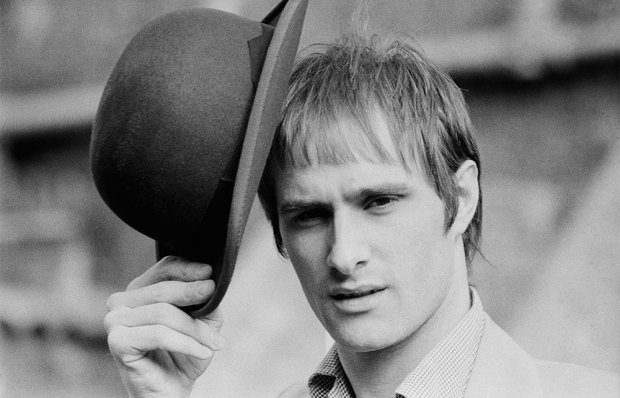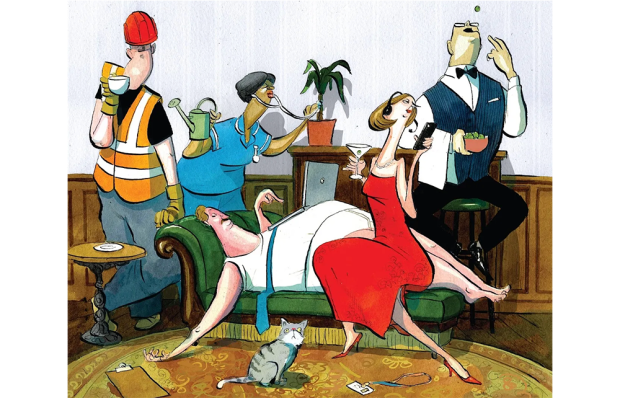Our society is bristling with social stigmas, we’re told, even in the progressive West, even in London. Life is so horribly stigmatised that celebrities are increasingly keen to raise awareness not of diseases or disabilities, but of the stigma that’s said to surround them. So: less campaigning for cancer research, more for breaking the stigma around talking about cancer. Less feeding the world, more brave standing up to the stigma attached to food poverty.
Once you’re alert for stigma, it’s astonishing how much mention of it there is. There are the obvious and much discussed stigmas surrounding mental illness and sexuality, but also (I’ve read) there’s a stigma around having red hair, blonde hair or black hair; being curvy or ‘naturally thin’ (the horror!); eating meat or eating ‘clean’ (‘Your love of raw vegan cheesecakes could be costing you friends’, reported the Independent).
Spotting stigmas is a rewarding game. My favourite so far is a po-faced report about the stigma attached to eating crisps. In this country we truffle up around six billion packets of crisps a year, which is more than every other European country put together. Has there ever been such a blissfully ineffective stigma? Stigmas are cited so often and with such confidence that I’ve begun to think of them as actual creatures, like the gremlins once said to cling to the wings of fighter planes — and almost as imaginary.
I first caught wind of the stigma industry earlier this summer, when several magazines reported the launch of a fashion range devoted to challenging ‘the stigma surrounding talking about ovaries’. The clothes themselves were stern, with a strong sense of moral duty. ‘Ovaries. Talk about them’ said the T-shirts in large print. Well, I tried, but what’s there to say? ‘Did you have a nice weekend? And what about your ovaries?’
The idea of the T-shirts was to raise awareness of ovarian cancer, but as the chief symptom of ovarian cancer is bloating, it was unclear to me in what way talking about ovaries would help. Perhaps ‘Bloating. Talk about it’ doesn’t work so well on a T-shirt. It was only after a few days that I thought to wonder: is there in fact any ovary stigma at all?
I know all about the old taboos. I grew up in the shadow of the Victorians, in a loving but fundamentally 19th-century matriarchy. Our family rarely mentioned any body part between the sternum and the knee (though I think the appendix was just about all right). The collective aunt-mind that watched over me and my cousins effectively pixellated anything below the waist. I’m not sure we even knew we had ovaries.
But now? Haven’t our ovaries been liberated from stigma? Female celebrities line up behind Kim Kardashian to discuss their fertility problems; it’s a rare weekend magazine that doesn’t contain a debate over whether women should freeze their eggs; and many large companies now offer their employees egg-freezing on the house. The only stigma attached to anyone’s ovaries in this country is a biological one.
And as with ovaries, so with that most familiar of social stigmas, the one that’s said to float fog-like around mental illness. I can’t tell you how many millions of words have been written in recent years about the stigma surrounding mental health; how many hundreds of thousands of well-funded research papers there are, full of suspiciously precise stats. There are surveys purporting to ‘prove’ stigma, in which the authors have simply asked passers-by if they reckon a stigma remains. Some write as if stigma can be collected, like cobwebs, from around the houses of backward, socially conservative types. Yes, it’s terrible to have a mental illness. But is it really still taboo to talk about it? In this country? In parts of Africa, having schizophrenia or depression is treated as a sign of demonic possession. Sufferers are sent to prayer camps where they’re tied to trees and starved. In this country, royal princes, the Archbishop of Canterbury and politicians from every party have admitted to struggling with depression. I know a woman who has ‘borderline personality disorder’ in her social media dating profile — which might be a sign of a mind off-kilter, or perhaps simply smart. Men seem keen on unhinged women.
This time last year, James Bartholomew wrote an interesting piece for this magazine about the ‘controversy paradox’. ‘It is a repeated phenomenon in human behaviour,’ he wrote, ‘that the less something is a problem, the more people talk about it, demonstrate about it and show their concern for it.’ Bartholomew was describing the rise in protests about racism and feminism in the liberal West, but I expect the same is true of stigmas. There are said to be stigmas everywhere. Every celeb and her Instagram dog is bravely standing up to stigma in one way or another precisely because there’s so little of it left. It’s all opportunity, no cost — except of course it’s at the expense of truth.
The big tell, the sign that stigma-busting is a largely bogus business, is the extent to which the PR arms of corporate giants have got involved. A few years ago Coca-Cola announced that it wasn’t just selling fizzy pop, it was on a mission, too: to bravely overcome ‘the sugar stigma’. Kotex, owned by the multinational Kimberly-Clark, doesn’t just sell sanitary products, it’s ‘tackling period stigma’ — though it’s not quite as overt about it in Saudi Arabia as it is in Australia. GlaxoSmithKline has developed a new long-acting HIV drug, not just to retain its grip on the market when its daily drug patent runs out, but to battle the stigma around HIV.
Back in 1991, Magic Johnson shocked the NBA and the world by announcing that he was HIV positive. Such was the ignorance and fear around Aids at that time that he had to retire. That was standing up to stigma.
Got something to add? Join the discussion and comment below.
Get 10 issues for just $10
Subscribe to The Spectator Australia today for the next 10 magazine issues, plus full online access, for just $10.
You might disagree with half of it, but you’ll enjoy reading all of it. Try your first month for free, then just $2 a week for the remainder of your first year.















Comments
Don't miss out
Join the conversation with other Spectator Australia readers. Subscribe to leave a comment.
SUBSCRIBEAlready a subscriber? Log in